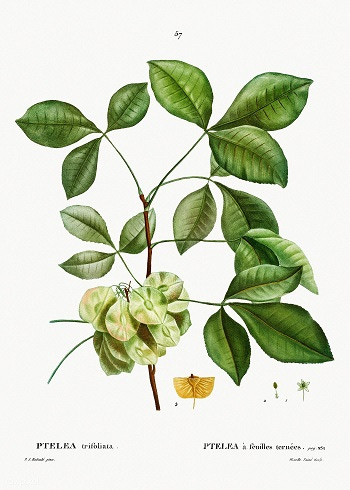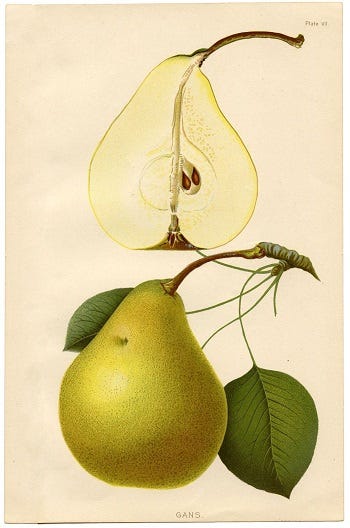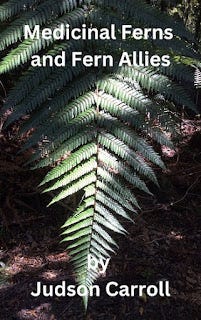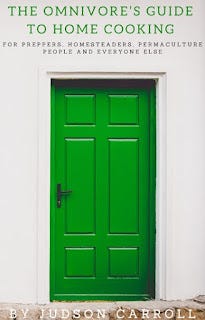Medicinal Trees: Ptelea, Hoptree and Pyrus, Pear
Ptelea, Hoptree
Three varieties of Ptelea have been found useful in Herbal Medicine: Ptelea baldwinii, Ptelea trifoliata - Hop Tree, Ptelea trifoliata mollis - Hop Tree
Of these tree type members of the Rue family, only one is native to my region, Ptelea trifoliata (Hoptree)
It is said that the fruit of this tree may be used in place of Hops in the bittering and preservation of beer, hence the name. Hop Tree was known to the ancient Greek herbalists. Dioscorides wrote:
The leaves, branches and bark of ptelea are all astringent. The leaves, pounded into small pieces with vinegar and so applied, are good for leprosy and heal wounds; but especially the bark, if it is wrapped around like a bandage, for it is flexible like a girdle. A measure of the thicker bark (taken in a drink with wine or cold water) expels phlegm. A decoction of the leaves or bark of the roots, applied with hot cloths, consolidates by drawing a callum [hard skin] over the fracture of a bone sooner. The moisture which is found in the bladders [undeveloped fruit] at their first sprouting clears the face when rubbed on it. The same moisture, dried, is formed into little creatures like gnats. The newly emerged leaves are used for sauce like vegetables.
Resources of the Southern Fields and Forests states:
HOP TREE, (Ptelea trifoliata, L.) Fla. and northward. Chap. N. C. A small genus of shrubs peculiar to America and India. This species is said by Schoepf, Mat. Med. Am., to be anthelmintic, a string infusion of the leaves and young shoots being used. The fruit is aromatic and bitter, and is stated to be a good substitute for hops.
King's American Dispensatory, 1898 tells us:
Action, Medical Uses, and Dosage.—Ptelea is tonic, and surpassed in this line only by hydrastis. Used after intermittent fevers, remittent fevers, and all cases of debility where tonics are indicated. Said also to be anthelmintic. Equal parts of ptelea and Euonymus atropurpureus, have been found very useful in pulmonary affections. A tincture of ptelea, made in whiskey, is reputed to have cured several cases of asthma, and is said to cause, in many instances where it has been used, a troublesome external erysipelatous inflammation, either general or local, but which, if the use of the tincture be persisted in, finally disappears, and the patient becomes, at the same time, permanently cured of the disease for which he was treated. This would certainly indicate other valuable properties in this plant, than those with which we are acquainted, which deserve a further and thorough investigation. Prof. I. G. Jones stated that this bark is a pure, unirritating tonic, having rather a soothing influence when applied to irritated mucous membranes. He has employed it advantageously in convalescence after fevers, and in debility connected with gastro-enteric irritation. It promotes the appetite, enables the stomach to endure suitable nourishment, favors the early reestablishment of digestion, and will be tolerated by the stomach when other tonics are rejected. He employed it in cold infusion, of which ½ fluid ounce may be given every 2, 3, or 4 hours, according to circumstances. It is also said to cure intermittent fever, and is considered by some to be equal to quinine. It may be used in powder, tincture, or extract. Dose of the powder, 10 to 30 grains, 3 or 4 times a day; of the tincture, 1 or 2 fluid drachms; of the extract, 5 to 10 grains; specific ptelea, 1 to 20 drops.
Specific Indications and Uses.—Asthmatic breathing; chronic diseases, with sense of constriction in the chest, and short breathing.
According to Plants for A Future:
Medicinal use of Hop Tree: The root-bark is anthelmintic, antibacterial, antiperiodic, stomachic and tonic. It has been mixed with other medicines in order to give added potency. It has a soothing influence on the mucous membranes and promotes the appetite, being tolerated when other tonics cannot be retained. It is also taken in the treatment of intermittent fevers such as malaria, heartburn, roundworms, pinworms and poor digestion. Externally it is applied to wounds. The roots are harvested in the autumn, the bark peeled off and dried for later use. The roots are a tonic, used in the treatment of asthmatic breathing, fevers, poor appetite etc. The leaves are said to be useful in the treatment of wounds and also in the destruction of intestinal worms.
Peterson Field Guides Eastern and Central Medicinal Plants tells us:
American Indians added root to strengthen other medicine. Historically used by physicians as a tonic (surpassed only by golden seal) for asthmatic breathing, fevers, poor appetite, gastroenteritis, irritated mucous membranes. A tea of the young leaves and shoots was once considered useful as a warm experiment. The bitter slightly aromatic fruits were once thought to be a useful substitute to hops in the manufacturer beer.
Pyrus, Pear
Two Pear trees have been naturalized in my region, Pyrus calleryana (Callery Pear, Bradford Pear) and Pyrus communis (Common Pear)
Dioscorides wrote of Pear:
There are many kinds of pears and they are all astringent and therefore fit to put into repellent poultices. A decoction of the dried ones (or if they are taken raw) stops discharges of the intestines, but if they are eaten they hurt those who eat them while fasting.
Achras is a kind of wild pear which takes long to ripen. It is more astringent than the pear, as a result it is good for the same purposes. The leaves of it are also astringent. Ash from the wood effectively helps those suffocated from eating mushrooms [antidote]. There are some who say that if anyone boils wild pears together with mushrooms they become harmless.
Saint Hildegard von Bingen wrote:
The pear tree is more cold than hot and is powerful and strong. It is to the apple tree as the liver is to the lungs. For, just as the liver, it is stronger and more useful, and indeed more harmful, than the apple….
The fruit of the tree is powerful heavy and harsh. If someone eats too much when it is raw, it gives his head a migraine and makes vapor in his chest. The lungs draw in the pear sap, which hardens like lead slag and tartar around the liver and the lungs, creating great infirmities in those organs. Just as a person is sometimes filled with the odor of wine, so also his breath mixes with the sap of the pear and takes its sharpness. Whence, after eating the raw pear, he will have difficulty drawing breath. Many infirmities come into the chest from this, since pears grow from dew at the close o day when dew’s power is weak. Unless they are cooked, pears create noxious humours in people, since they grow when the dew is flagging.
Anyone who wishes to eat pears should place them in water or roast them on a fire. Boiled pears are better than those roasted, since the warm water gradually cooks out the harmful sap which is in them. Fire is too quick and in roasting not all the moisture is expressed from them. Cooked pears sometimes oppress the one who eats them, since they seek out any rotten matter in him and diminish it, breaking it up,. Nevertheless, they give him good digestion since they remove the rotten matter. The fruits are easily digested and do not bring in rotten matter with them. Take pears, cut them, and throw out their cores. Cook them vigorously in water. Then take hog’s fennel and a little less galingale, licorice (less than galingale) and savory (less than licorice). If you do not have hog’s fennel, take fennel root and reduce it to a powder. Mix it with the other powders and put them in a bit of warm honey. Add the prepared pears, mix this well, and place it in a small container. Every day eat one small spoonful before breakfast; eat two spoonfuls with a meal; eat three spoonfuls at night, in bed. This electuary is very good, and more precious than gold, since it carries away migraine and diminishes vapor which raw pear creates in a person’s chest. It consumes all bad humours in a person, and so cleanses the person, just as a vessel is washed of its impurities.
Gerard had similar concerns about uncooked pears, centuries after Saint Hildegard:
A. Leaving the divers and sundry surnames of pears, let us come to the faculties which the physicians ought to know; which also vary according to the differences of their uses: for some pears are sweet, divers fat and unctuous, others sour, and most are harsh, especially the wild pears, and some consist of divers mixtures of tastes, and some having no taste at all, but as it were a waterish taste.
B. All pears are cold, and all have a binding quality and an earthy substance: but the choke pears and those that are harsh be more earthy, and the sweet ones less: which substance is so full of superfluous moisture in some, as that they cannot be eaten raw. All manner of pears do bind and stop the belly, especially the choke and harsh ones, which are good to be eaten of those that have the lask and the bloody flux.
C. The harsh and austere pears may with good success be laid upon hot swellings in the beginning, as may be the leaves of the tree, which do both bind and cool.
D. Wine made of the juice of pears called in English, perry, is soluble, purgeth those that are not accustomed to drink thereof, especially when it is new; notwithstanding it is as wholesome a drink being taken in small quantity as wine; it comforteth and warmeth the stomach, and causeth good digestion.
Culpepper wrote of Pear:
The tree belongs to Venus, and so doth the apple-tree. For their physical use they are best discerned by their taste. All the sweet and luscious sorts, whether manured or wild, do help to move the belly downwards, more or less. Those that are hard and sour, do, on the contrary, bind the belly as much, and the leaves do so also. Those that are moist do in some sort cool, but harsh or wild sorts much more, and are very good in repelling medicines; and if the wild sort be boiled with mushrooms, it makes them less dangerous. The said Pears boiled with a little honey, help much the oppressed stomach, as all sorts of them do, some more, some less: but the harsher sorts do more cool and bind, serving well to be bound to green wounds, to cool and stay the blood, and heal up the green wound without farther trouble, or inflammation, as Galen saith he hath found by experience. The wild Pears do sooner close up the lips of green wounds than others.
Schola Selerni advises to drink much wine after Pears, or else (say they) they are as bad as poison; nay, and they curse the tree for it too; but if a poor man find his stomach oppressed by eating Pears, it is but working hard, and it will do as well as drinking wine.
An Irish Herbal States:
Pears stop the diarrhea, and can also be applied to fresh, green wounds which they heal.
This article is an excerpt from The Medicinal Trees of the American South, An Herbalist's Guide: by Judson Carroll
His New book is:
Read About:
Medicinal Ferns and Fern Allies, an Herbalist's Guide
Available for purchase on Amazon:
https://www.amazon.com/dp/B0BMSZSJPS
His new cookbook is:
Read About The Omnivore’s Guide to Home Cooking for Preppers, Homesteaders, Permaculture People and Everyone Else"
https://southernappalachianherbs.blogspot.com/2022/10/the-omnivores-guide-to-home-cooking-for.html
Available for purchase on Amazon:
https://www.amazon.com/dp/B0BGKX37Q2
His other works include:
Medicinal Shrubs and Woody Vines of The American Southeast An Herbalist's Guide
Read about Medicinal Shrubs and Woody Vines of The American Southeast An Herbalist's Guide: https://southernappalachianherbs.blogspot.com/2022/06/medicinal-shrubs-and-woody-vines-of.html
Available for purchase on Amazon: https://www.amazon.com/dp/B0B2T4Y5L6
Growing Your Survival Herb Garden for Preppers, Homesteaders and Everyone Else
Read About Growing Your Survival Herb Garden for Preppers, Homesteaders and Everyone Else: http://southernappalachianherbs.blogspot.com/2022/04/growing-your-survival-herb-garden-for.html
Available for purchase on Amazon: https://www.amazon.com/dp/B09X4LYV9R
The Encyclopedia of Bitter Medicinal Herbs:
southernappalachianherbs.blogspot.com/2022/03/the-encyclopedia-of-bitter-medicina.html
Available for purchase on Amazon:
https://www.amazon.com/dp/B0B5MYJ35R
Christian Medicine, History and Practice:
https://southernappalachianherbs.blogspot.com/2022/01/christian-herbal-medicine-history-and.html
Available for purchase on Amazon: www.amazon.com/dp/B09P7RNCTB
Herbal Medicine for Preppers, Homesteaders and Permaculture People
southernappalachianherbs.blogspot.com/2021/10/herbal-medicine-for-preppers.html
Also available on Amazon: https://www.amazon.com/dp/B09HMWXL25
Look Up: The Medicinal Trees of the American South, An Herbalist's Guide
http:///www.amazon.com/dp/1005082936
The Herbs and Weeds of Fr. Johannes Künzle:
https://southernappalachianherbs.blogspot.com/2021/05/announcing-new-book-herbs-and-weeds-of.html
Author: Judson Carroll. Judson Carroll is an Herbalist from the Blue Ridge Mountains of North Carolina.
His weekly articles may be read at judsoncarroll.com
His weekly podcast may be heard at: www.spreaker.com/show/southern-appalachian-herbs
He offers free, weekly herb classes: https://rumble.com/c/c-618325
Disclaimer
The information on this site is not intended to diagnose or treat any disease or condition. Nothing on this site has been evaluated or approved by the FDA. I am not a doctor. The US government does not recognize the practice of herbal medicine and their is no governing body regulating herbalists. Therefore, I'm just a guy who studies herbs. I am not offering any advice. I won't even claim that anything I write is accurate or true! I can tell you what herbs have "traditionally been used for." I can tell you my own experience and if I believe an herb helped me. I cannot, nor would I tell you to do the same. If you use any herb I, or anyone else, mentions you are treating yourself. You take full responsibility for your health. Humans are individuals and no two are identical. What works for me may not work for you. You may have an allergy, sensitivity or underlying condition that no one else shares and you don't even know about. Be careful with your health. By continuing to read my blog you agree to be responsible for yourself, do your own research, make your own choices and not to blame me for anything, ever.






